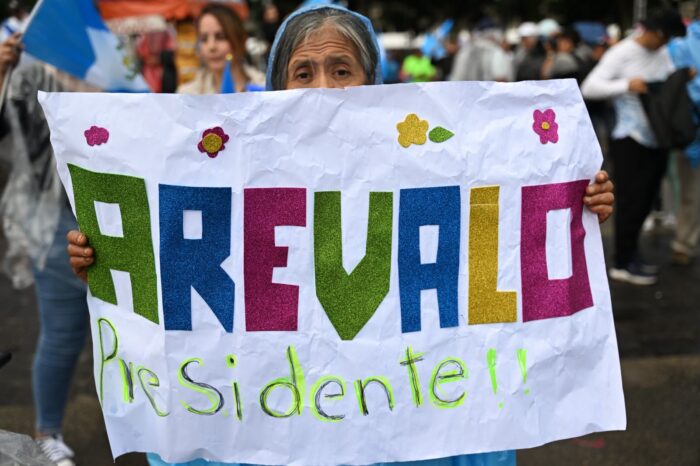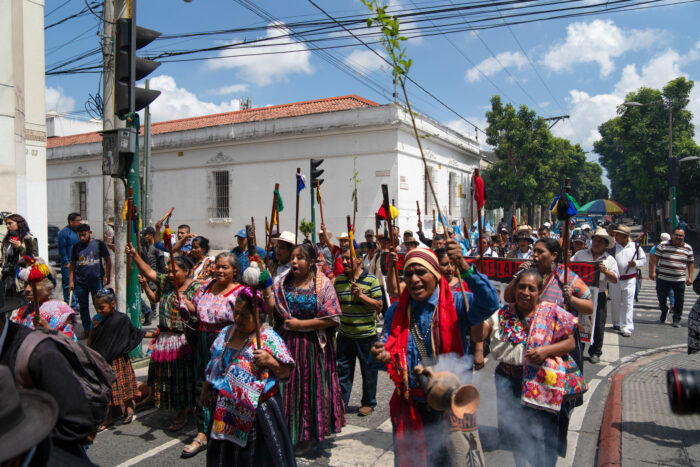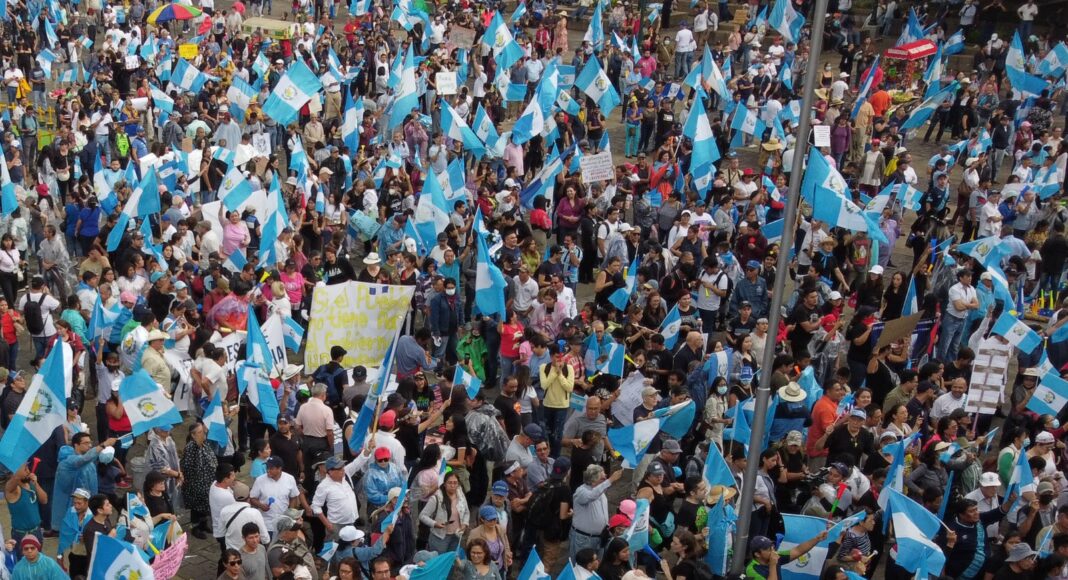We are witnessing a Coup … There’s a group of corrupt politicians and officials who refuse to accept the result and they’ve launched a plan to flout the constitution and violate democracy.
President-elect Bernardo Arévalo at a hastily-called press conference on September 1.
Powerful politicians in Guatemala overlooked one tiny centre-left party when they used spurious charges to eliminate several parties from the June 25 election race. Everyone was surprised when the little Semilla (Seed) party, led by Presidential candidate Bernardo Arévalo, pulled off a massive upset by advancing to the runoff, and then, with its offer of ‘a new Guatemalan Spring’, won a landslide victory against the UNE party of Sandra Torres on August 20. Millions of long-dispossessed, impoverished Guatemalans, many of them Indigenous Maya, took to the streets in an explosion of joy.
However, Guatemala’s political elites were much less thrilled. Perhaps that’s because Semilla’s stated aim is to crack down on corruption. The country’s political and economic elites have been infiltrated by some of Guatemala’s shadiest figures, collectively known as the ‘Pacto de Corruptos.’ They’ve long controlled most state institutions and benefitted by demanding bribes from those investing in Guatemala’s exploitative economy. (They’ve helped mining companies remove Indigenous people from their land, provided soldiers as guards to protect mining concessions, offered generous tax concessions to those involved in tourism, hydroelectric dams, or maquiladora sweatshops.) In response to Semilla’s landslide win, plans were quickly hatched by those in power to use the courts to prevent the Semilla party from entering government in January 2024.
From protesters to parliamentarians
Tiny Semilla was born during student protests against corruption six years ago. Samuel Pérez Álvarez transitioned from leading anti-corruption sit-ins to becoming Secretary General of Semilla and earning a seat in the Guatemalan Congress. It’s a powerful reminder of the potential for peaceful protest to effect meaningful change. Now just 30, he is a noted thinker and economist, and young educated Guatemalans specifically are rallying to this democratic cause. Out in the countryside, millions of poor Guatemalans, the majority Indigenous Maya, who make up 60 per cent of the population, learnt about Semilla, and enthusiastically joined their fight against corruption.
‘We are a marginalized people who have been stripped of our rights and are tired of so much corruption. It’s a big win for democracy. Hopefully Semilla can create a more inclusive state,’ Roberto, a young K’iche man from Nahuala, Solola, told journalists.

A new tactic of the political elite: lawfare
Change is difficult to effect in this Central American country. 50 years ago, those who wanted change in Guatemala could be assassinated in broad daylight. In 1979 I made a film about the killing of another Presidential hopeful. Alberto Fuentes Mohr was also a social democrat who advocated reform. He was driving to lunch with the Vice President when he was gunned down on one of Guatemala City’s busiest streets named, ironically, Avenida Reforma. There were plenty of witnesses but no investigation.
Today, however, such attacks are less blatant, but equally dangerous. They come via compliant judges and prosecutors, whose methods include sending honest people to prison or threatening them into exile. There is a new term for what is happening in Guatemala: ‘lawfare’. Sometimes it seems like judicial ping pong, with injunctions flying from court to court. Often, it’s more like snakes and ladders – and right now there are a lot of snakes.
To understand this phenomenon, let’s briefly look back:
The shadows of the past hang over Guatemala’s 2023 election
History never really says “goodbye.” History says “See you later”.
Eduardo Galeano
Semilla’s President-Elect, Bernardo Arévalo, is the son of Guatemala’s much-loved and first democratically-elected President, Juan Jose Arévalo, who succeeded decades of military dictatorships in 1945. He was also a social democrat who promised that moderate reforms would bring a ‘Guatemalan Democratic Spring’, as did his successor, Jacobo Árbenz. But United Fruit felt threatened by his plans for limited land reform and the company was closely connected to the Dulles brothers, one of whom was head of the CIA. These were the Cold War years, and Washington lived in dread of the ‘red menace’ creeping up the map of the Americas. In 1954, Árbenz, a social democrat, was violently overthrown by a CIA-organized and executed coup.
The following decades saw US-backed military dictatorships ordering brutality in the supposed fight against ‘communism’, even though the real problem was inequality. The early 80’s saw the genocide of over 200,000 desperately poor Maya along with hundreds of left-wing activists. When democracy returned after Peace Accords in 1996, military brutality morphed into an epidemic of gun violence.
Guatemala’s democratic leaders have all too often been authoritarians and ex-Military Generals. Today’s elite consists of political leaders, wealthy members of the oligarchy with their sugar and palm oil plantations, businessmen with huge fortunes from mining gold, copper, and nickel, and shady operators said to have mafia connections.
In 2007, a UN-backed anti-corruption tribunal was installed. The aim was to root out spiralling corruption and organized crime. Its investigations helped bring ex-President Dictator General Rios Montt to trial on charges of genocide and Crimes Against Humanity. He was sentenced to 80 years, but a superior court overturned the sentence. Then crowds (with Semilla’s founders among them) took to the streets to demand sitting President and ex-military officer, Otto Perez Molina, be sent to prison for receiving millions of dollars in bribes in exchange for awarding more than 70 contract to various companies. But when the Tribunal commenced investigating the campaign finances of the next President, Jimmy Morales, he shut it down.
Since then, the Guatemalan judicial system has been systematically destabilized. 39 honest judges and prosecutors have fled to exile, replaced by compliant jurors, some willing to do dirty work to help protect the interests of the powerful. After shuttering the Tribunal, Jimmy Morales appointed María Consuelo Porras as Attorney General. She began unravelling all the progress it had made.

Lawfare in the 2023 Guatemalan Presidential Elections
Guatemala’s new president does not take office until January 14, 2024. The interregnum provides a dangerous power vacuum in which opponents can conspire and wreak havoc – ideal territory for lawfare. Here are some of the challenges that have already been launched against Semilla:
In spite of the fact that teams from the European Union and the OAS observed and approved the first vote on June 25, Attorney General María Consuelo Porras instructed her chief prosecutor, Rafael Curruchiche, to order a raid on the offices of both Semilla and the Supreme Electoral Council which had also approved the election results. Next, Curruchiche found a judge (Fredy Orellana) who agreed to suspend the Semilla party’s legal status, based on unverified claims of fraudulent signatures in the list of members used to back the registration of Semilla six years ago. This was illegal during an election. And the outside world was watching:
The authorities must respect the will of the voters as expressed on June 25.
Volker Turk, UN High Commissioner for Human Rights.
The US responded by adding Judge Orellana to its growing list of the corrupt. Secretary of State Antony Blinken stated: ‘We look forward to working with the President-elect and will stand firm against attempts to undermine Guatemala’s democracy.’
On August 20, as millions celebrated when Arévalo and Semilla won their landslide second-round victory, Consuelo Porras was busy again. The very next day she ordered another police raid on The Supreme Electoral Council, demanding the arrest of the Council’s head and lists of all those who had worked during the election.
Three days later, on August 24, the Inter-American Commission on Human Rights (IACHR) announced it had uncovered two plans to kill Arévalo and his running mate, Karin Herrera, and demanded they be given protection. One plot was called ‘Plan Colosio’, after a Mexican Presidential candidate who was assassinated in 1994.
The following day, August 25, Consuelo Porras filed with the Constitutional Court for her own protection, claiming imminent threats for herself, Rafael Curruchiche, Special Prosecutor in the Office against Impunity, and fiscal agent Cinthia Monterroso. She also demanded that the Twitter accounts of some political commentators be cancelled. Journalists called this an attack on freedom of speech. The Constitutional Court denied her application.
‘They are stealing the election in broad daylight, using one of the very institutions which is supposed to protect us,’ wrote Gustavo Marroquin, a Guatemalan history professor and columnist, on Twitter.
The US State Department also publicly condemned Porras’ intimidation tactics and ‘abuse of prosecutorial powers.
On August 28, the Supreme Electoral Council officially confirmed that Semilla had won the election with 2,442,718 votes (56 per cent). However, Prosecutor Curriche, using Judge Orellana’s earlier order, persuaded the Director of the Citizens Registry to suspend the party. Experts in constitutional law condemned this action.
‘This regime is not only corrupt, but authoritarian,’ Deputy Samuel Pérez told Democracy Now!, adding that Semilla had uncovered a plot to ‘disappear’ the party and annul the support of the people of Guatemala.
Then, on August 29: the coup de grâce. Shirley Rivera, President of Congress, announced that the party’s elected deputies can only sit as independents, so the Semilla Party cannot formulate and execute new policies. Congress meekly followed his lead. There was no debate. Legal experts said he has no right to do this.
25 former heads of state from all around the world signed a letter calling for a fair election transition.
Citizens again took to the streets, demanding their vote be respected and denouncing Congress’s move to block Semilla. Arévalo begged them to do this peacefully and to avoid being trapped into violent situations.
Responding to this critical situation, monitoring teams from the OAS and CIDH (International Human Rights Commission) returned to Guatemala, pledging to remain until the January inauguration.
Knowing the world was watching, the Guatemalan Electoral commission temporarily rescinded the order denying the Semilla party’s status until October 31 when the election period officially ends. Congress followed suit, and on September 4, outgoing president Giammattei promised a smooth transition to president-elect Arévalo. The question now is: will that promise be fulfilled, and what will happen after October 31?
Arévalo continues to warn of ongoing persecution by the Attorney General. Protests continue all around the country, and 100,000 demonstrators have signed a petition demanding the immediate resignation of Consuelo Porras and her team. Outside the Presidential Palace, Maya communities held a symbolic ceremony to declare ancestral Maya justice against those, including President Giammettei, who have ‘consolidated’ corruption in Guatemala.
When a person robs a chicken or corn in a village, justice is applied. So we call on the national authorities to also apply justice, because these people are stealing the future of new generations in this country.’
Sebastian Por, ancestral authority of the Maya K’iche
Meanwhile, Sandra Torres, whose UNE party lost the election, has refused to concede. Relying on the claims of the Attorney General’s office, she claims they were fraudulent and demands that they be annulled.
If, on January 14 2024, tiny Semilla does take power, it will face the daunting task of confronting the Pacto de Corruptos and the foreign companies who back them. Can they replace the ‘Pacto de Corruptos’ with ‘a New Guatemalan Spring?’
Judy Jackson is a filmmaker whose documentaries about issues of social justice have won more than 60 international awards.
Main image: A rally in Plaza de la Constitución, Guatemala City, on September 2 saw at least 4,000 people gather in protest against María Consuelo Porras. Photo: Prensa Comunitaria.

